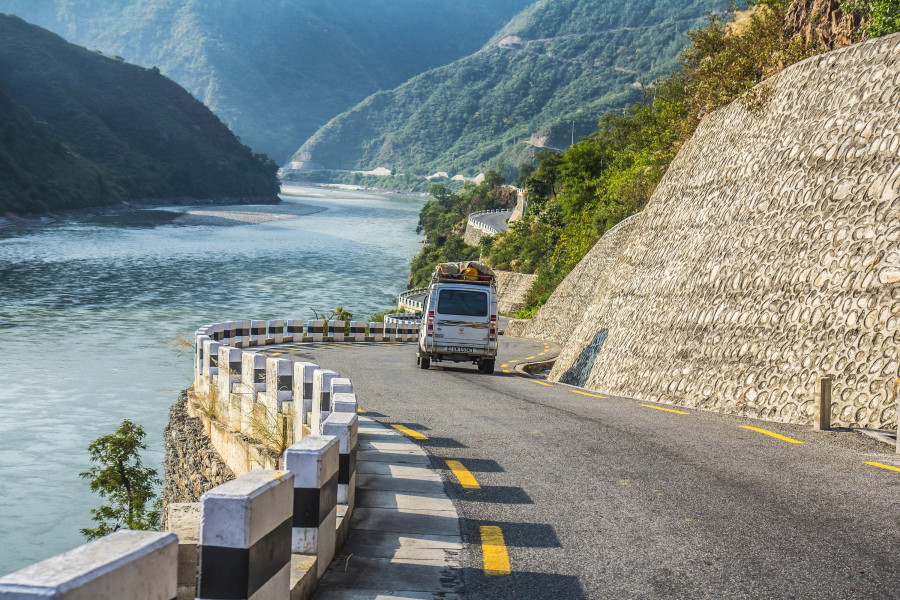Money
Sunkoshi Marin Diversion Multipurpose Project gathers steam
The Rs83 billion scheme will provide round-the-year irrigation facility to five drought-prone Tarai districts.
Prahlad Rijal
According to officials, the environmental impact assessment, the final essential study before the project begins funding arrangements and tender processes, is on the verge of being approved by the Ministry of Forests and Environment.
“We have received word that Forest Ministry officials will give the go-ahead within a week,” said Sushil Acharya, project chief. “No concerns have been raised by forest and environment authorities, and the project has held a public hearing with project-affected locals and informed them of land acquisition. The compensation distribution is yet to begin.”
The Rs83.51 billion project located in Sindhuli and Ramechhap districts aims to divert water from the Sunkoshi River to the Marin Khola, a tributary of the Bagmati River, and augment discharge into the Bagmati Irrigation Canal to irrigate an additional 122,000 hectares of land in the Tarai while generating 28.62 megawatts of electricity.
Once complete, the diversion project will provide round-the-year irrigation facility to drought-prone districts of Rautahat, Dhanusha, Mahottari, Sarlahi and Bara where insufficient rainfall has become a recurrent problem affecting agricultural output.
At present, the flow rate of the Bagmati River is around 5-6 cusecs, which is insufficient for farmers, mainly in Rautahat and Sarlahi districts, without irrigation facilities in the dry season. Heavy reliance on rainwater coupled with lack of irrigation facility has led to lowered outputs adversely affecting the country’s economy.
The five-year multipurpose project has been envisioned to draw 77 cusecs of water from the Sunkoshi River by building a 12-metre-high dam and supply 48 cusecs to farmers in Rautahat, and 64 cusecs to farmers in Sarlahi, among other districts.
According to the Ministry of Energy, Irrigation and Water Resources, only one-third of the total irrigated farmlands in the country have year-round-irrigation facility, and projects such as the Sunkoshi Marin are crucial to boosting the country’s agricultural output.
As per a draft of the environmental impact assessment, the proposed multipurpose project will inundate a total of 312 hectares of land and create a pond in Sunkoshi and Khadadevi rural municipalities and Manthali municipality affecting 3,026 households.
The project needs to acquire 69.46 hectares of private land, 18.87 hectares of farmland without ownership papers, and 251.34 hectares of public land which includes 6.58 hectares of forests.
Also, the project will inundate a 1-km stretch of Banepa-Bardibas Highway (BP Highway) and a 475-metre stretch of the road will have to be relocated to accommodate water intake and other structures.
When asked about the possible inundation of the recently reconstructed infrastructure, project chief Acharya said that project authorities had held multiple discussions with Roads Department officials, and that they were currently drawing a new design to shift the road section.
“We are coordinating with all stakeholder agencies, and it will take some time to sort things out,” said Acharya. “Also, we are yet to receive a resource commitment, decide on funding modalities, and pay compensation to landowners in the project affected areas.”
The environmental impact assessment report also points out that out of the three potential storage projects in the region, the proposed 1100-megawatt Sunkoshi II reservoir project will be adversely affected, if the diversion project is built.
According to Gokarna Panta, deputy spokesperson for the Energy Ministry, the government has aimed to start construction within the current fiscal year.
“The 2018 white paper released by the ministry has prioritised building one multipurpose project in each province to the extent possible, and Sunkoshi Marin is an important project in the development plan,” said Panta. “The detailed project report is ready, and the National Planning Commission has given its approval to begin a multi-year contract process to execute the project.”
To offset negative externalities, the government plans to promote boating and other tourism activities in the affected area, and also release fish in the proposed pond to revive the traditional occupation of the Majhi community which resides in the region.
The cost of the irrigation component is estimated to be Rs37.2 billion, and the hydropower component is expected to be built at a cost of Rs46.19 billion.
Sunkoshi Marin will be the second inter-basin infrastructure project to make use of a tunnel boring machine after the Bheri Babai Diversion Multipurpose Project in Surkhet.




 8.43°C Kathmandu
8.43°C Kathmandu














